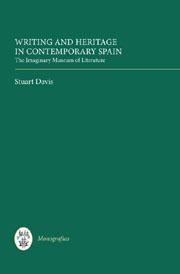Book contents
- Frontmatter
- Contents
- Acknowledgements
- Introduction
- 1 Presenting the Museum
- 2 Never-ending Story: Canon Fever
- 3 Working Models, Model (Re)Workings: Goytisolo and Cervantes
- 4 The Authoritative Gaze: Cristina Peri Rossi
- 5 Generations Apart? The ‘Generation X’ in Spanish Literature
- Conclusion: What do we do with the Gifts of the Past?
- Works Cited
- Index
Conclusion: What do we do with the Gifts of the Past?
Published online by Cambridge University Press: 05 February 2013
- Frontmatter
- Contents
- Acknowledgements
- Introduction
- 1 Presenting the Museum
- 2 Never-ending Story: Canon Fever
- 3 Working Models, Model (Re)Workings: Goytisolo and Cervantes
- 4 The Authoritative Gaze: Cristina Peri Rossi
- 5 Generations Apart? The ‘Generation X’ in Spanish Literature
- Conclusion: What do we do with the Gifts of the Past?
- Works Cited
- Index
Summary
Todos los objetos mudos saben contar una historia
Ángeles LópezBy making the (mortal) Photograph into the general and somehow natural witness of “what has been”, modern society has renounced the Monument.
Roland BarthesVisit: El Valle de los Caídos
My first ever visit to Spain occurred at the age of eighteen, on a school exchange from my sixth form college with a school near Valencia. I remember little of the trip, except that my small amount of Spanish was laughably inadequate for most situations and that, as a vegetarian at the time, eating was usually no pleasure – while my host family enjoyed eating octopus, much to my horror, I was provided with a bowl of boiled cauliflower. My second visit, a year later as an undergraduate languages student, was more successful. I flew out to stay with a penpal and her parents. Their culinary expertise was wider (although it would take another year for me to give up on vegetarianism in Spain), my language skills better and the family's generosity almost overwhelming. Determined to show me the best that Spain had to offer, my week-long stay was a giddy whirlwind of the best sights of Madrid, and also further afield. My friend's retired father drove us across the - to my eyes - dreadfully barren landscape to beautiful historic cities such as Ávila, Segovia, Toledo, even as far as a day trip to Salamanca.
- Type
- Chapter
- Information
- Writing and Heritage in Contemporary SpainThe Imaginary Museum of Literature, pp. 179 - 198Publisher: Boydell & BrewerPrint publication year: 2012



